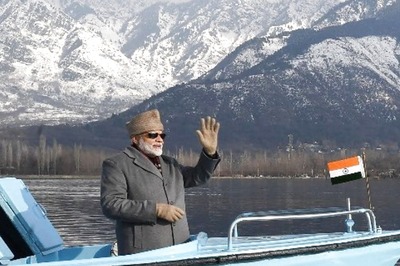
views
Delhi: The Central government has told the Supreme Court that there cannot be a direction to permit Rohingya refugees from Myanmar to enter India.
Submitting its fresh affidavit in the Court, the Ministry of Home Affairs has maintained that national interest requires that only those holding valid travel documents be permitted to enter Indian soils.
The government emphasised that India is already facing a serious problem of infiltration due to its porous border with other countries, a root cause of spread of terrorism in the country that has claimed thousands of lives of innocent citizens and security personnel.
“Securing the border of any sovereign nation in accordance with law is an essentially executive function and this Court would not issue a writ directing not only the Central government but all the state governments having a common border to ensure foreigners enter the territory of India," stated the affidavit.
Steps being taken by any border guarding force, MHA added, is strictly in accordance with the law and in the interest of the nation, to protect large human rights of its citizens.
The government's response has come to a plea, alleging the forces at the Indo-Myanmar border were pushing back Rohingya refugees, using chilli spray stun grenades and other forceful methods.
While the affidavit denied usage of these methods, the government made it clear that only those with valid travel documents can be allowed in India and that no court should permit others to enter.
Replying to another prayer for issuance of refugee identification cards to Rohingya, the government said that this subject was exclusively within the ambit of policy matter and that the government has decided to issue no such card to any refugee.
"There being no law passed by Parliament with regard to refugees, there cannot be any issuance of refugee identification card to any person," said the affidavit.
The MHA also distinguished between Sri Lankan Tamil refugees with Rohingya and said there was "comparable parity" between the two.
It pointed out that Tamil refugees were allowed in terms of bilateral treaty between India and Sri Lanka, in 1964, 1974 and again in 1986, whereas there is no such agreement between India and Myanmar.
A bunch of PILs have been filed in the Supreme Court to stop deportation of Rohingya Muslim refugees, who reportedly fear persecution in Myanmar.
While making it clear that there was no agreement or convention that binds Indian government to give asylum to Rohingya, the government has assured the Court that no coercive steps shall be taken against them while the case is pending in the apex court.
The petitioners had recently moved an application against what it alleged was a push-back along the border. The plea also asked for access to medical and educational facilities.
The Court will hear the case next on Monday.

















Comments
0 comment